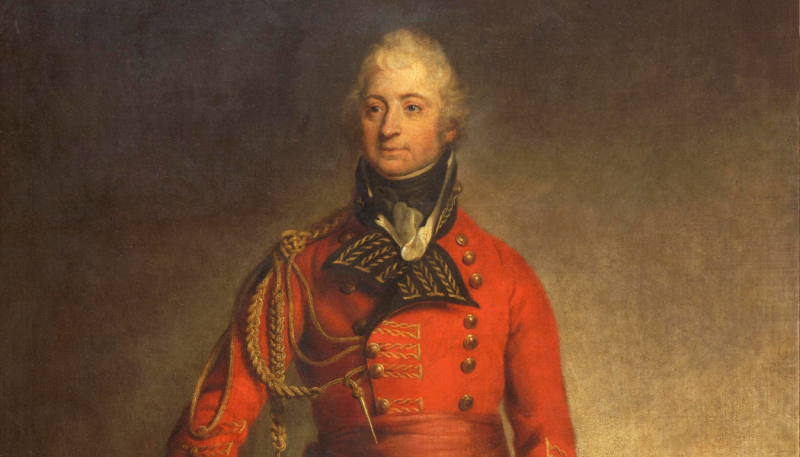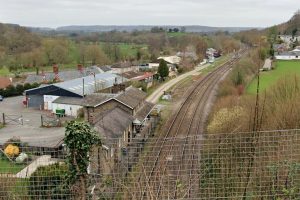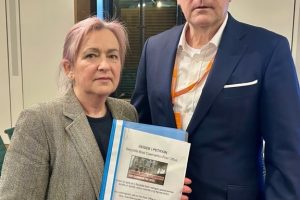THE NATIONAL Museum of Wales has re-hung a portrait of Pembrokeshire-born Sir Thomas Picton as part of an exhibition that reframes his place in history.
Following the UK Black Lives Matter protests, the Museum removed the former Governor of Trinidad’s picture from public display.#It now returns as part of an exhibition that provides additional information and context about Picton’s legacy as Governor of Trinidad at the turn of the 19th century.
The contextual information now includes his brutal treatment of the people of Trinidad, including the torture of 14-year-old Luisa Calderon – information which was not part of the Museum’s previous interpretation of the portrait.
The project team looked at objects across Amgueddfa Cymru’s collections to reinterpret the narrative around Picton.
Objects included in the interpretation included:
- A newly acquired transcript of the trial of Picton in London in 1806.
- Anti-slavery medals, produced to support the late 18th-century anti-slavery movement in Great Britain.
- A medal from the 1819 Eisteddfod, won by Walter Davies in 1819 for an ode to Picton.
The Reframing Picton project team said: “For generations, even up to recent years, saying “Black Lives Matter” has been controversial.
“In the time we worked on this project, we made a point to expose – not erase – history, and it was essential that we directly involved people connected to Trinidad, where Picton entrenched his reputation for barbarism during his tenure as Governor.
“One of our goals for this exhibition was to create a site of conscience rather than indoctrination. To create healthy ways of addressing trauma. To create a dialogue between museums, the governments that fund them and the communities they serve.
“We hope that this exhibition will encourage visitors of all backgrounds to listen and learn from the past, and to put these learnings into practice today.”

The commissions follow a callout by Amgueddfa Cymru in January 2021 for artists to explore alternatives to the colonial narrative represented by the portrait of Lieutenant-General Sir Thomas Picton and to centre on Black experiences.
The new artworks by Gesiye and Laku Neg explore narratives of ancestry, healing, transformation and empowerment. They challenge the colonial narratives traditionally existing in National Museum Cardiff’s galleries by centring on Black consciousness, experiences, and voices.
Dr Kath Davies, Director of Collections and Research at Amgueddfa Cymru, said: “This project is the culmination of such positive working between Amgueddfa Cymru and the Sub Sahara Advisory Panel’s Youth Leadership Network and the Amgueddfa Cymru Producers.
“It highlights the importance and the positive outcomes that result from working together and listening to one another.
“We are very grateful to the young people of the SSAP’s Youth Network for their time in working with us at the Museum. We’re very proud of the artworks that have now entered the national collection.
“We thank the artists for working through a pandemic and across international borders. We hope that they spark conversations on representation and the many histories of Wales in a modern-day museum.”
Fadhili Maghiya, Director at the Sub Sahara Advisory Panel, said: “For the longest time, Picton has been celebrated in Wales. Now, for the first-time communities that were historically exploited and abused by the likes of Picton have a reason to celebrate
“There might be misconceptions that Amgueddfa Cymru – Museum Wales and the Sub-Sahara Advisory Panel’s Youth Network seek to rewrite history with this project.
“However, that is far from the truth.
“Reframing Picton aims to rewrite our future by challenging the way we engage with history. The project enables us to widen the spotlight that has for many years hidden the darkness of Picton in all its full and truthful context.”
Minister for Social Justice Jane Hutt said: “We’ve made it clear that we are committed to creating an anti-racist Wales by 2030, but to achieve this objective, we must all think about who we commemorate and how we do so.
“Amgueddfa Cymru has worked with many stakeholders to update its interpretation of Picton.
“Projects like this, demonstrate how important it is to understand our past, this isn’t about rewriting history, it’s about highlighting the context and taking a more holistic view of our past.”












